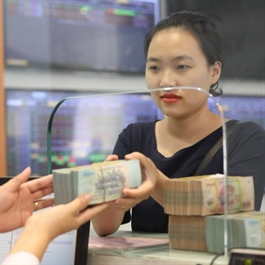General Department of Taxation reviews draft regulations on loan interest expense cap
General Department of Taxation reviews draft regulations on loan interest expense cap
The General Department of Taxation (GDT) is seeking solutions to amend the loan interest expense cap regulation at 30 per cent to solve difficulties for businesses in the context of high interest rates in the period 2022-23.

Illustrative image. Businesses are complaining about difficulties with Decree 132/2020/NĐ-CP on tax management for enterprises with associated transactions. — Photo tienphong.vn |
The GDT said that it has coordinated with six local tax departments to organise a conference to review a draft decree that amends and supplements Decree 132/2020/NĐ-CP on tax management for enterprises with associated transactions.
GDT deputy director Đặng Ngọc Minh said that the GDT is collecting opinions of agencies and units after consulting with ministries, localities and the business community.
"The draft decree amending and supplementing Decree No. 132 aims to approach the reality of business operations, creating maximum convenience for taxpayers as well as the overall development of the economy,” said Minh.
In early January, the Vietnam Chamber of Commerce and Industry (VCCI) already sent a proposal to the Ministry of Finance about problems with Decree 132. VCCI said the loan interest expense cap regulation under the draft decree will have adverse impacts on enterprises and the ability to form economic groups in the country.
According to VCCI, businesses reported that tax authorities consider transactions between businesses and banks as affiliated transactions, thereby eliminating interest costs exceeding the allowed ceiling. Meanwhile, in 2022 and 2023, lending interest rates on the market increased sharply, causing interest costs of many businesses to exceed the allowed limit.
In that situation, Decree 132’s regulations cause businesses to suffer double difficulties, having to pay more interest to banks, but not being able to deduct taxes for this cost. These regulations have a strong impact on businesses that use a lot of capital in fields such as infrastructure, production, processing and manufacturing.
“The interest rate of the loan corresponds to the average level of the capital market. Both businesses and banks have shown no signs of intentionally increasing interest costs to reduce tax liability. Therefore, the 30 per cent loan interest expense cap regulation would cause difficulties to businesses," said the VCCI.
The Ministry of Finance also issued a document collecting comments on amending Decree 132 in the direction of eliminating linkages between banks and businesses. However, the process of amending Decree 123 may take a long time. Meanwhile, in the current period, businesses are being inspected and tax examined for the 2022 and 2023 fiscal years.
If there are no immediate measures, it can have a very negative impact on the production and business situation of businesses as well as the stability and consistency of Việt Nam's investment environment, according to the VCCI.
Previously, businesses said that after three years of implementation, Decree 132 had revealed many inadequacies, causing difficulties in production and business activities. One of the bottlenecks that are making many businesses "cry" is the regulation that limits the ceiling of EBITDA (Earnings Before Interest, Taxes, Depreciation and Amortisation) at 30 per cent (Point a, Clause 3, Article 16).
Enterprises said that 30 per cent is the control level of developed countries. The application of anti-thin capitalisation rule of developed countries is not consistent with the reality of Việt Nam, a developing economy with most businesses having thin capital, being in the start-up phase and needing to use a lot of loan capital.
























